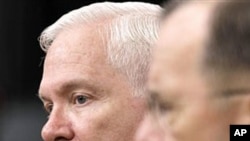U.S. Defense Secretary Robert Gates on Tuesday urged Congress to end the ban on homosexuals serving openly in the U.S. military, after a task force he assembled concluded that any negative effect of the change would be minimal and short-term. The study was designed to assess the impact of implementing President Barack Obama's promise to end the ban, and to recommend how to do it.
The task force report, which was made public on Tuesday, says 70 percent of service members chose "positive," "mixed" or "no effect" when asked about the impact of ending the ban. The report acknowledges that concerns are higher in the Marine Corps, with 58 percent of combat Marines expressing concern about potential negative repercussions of allowing open homosexuals to serve. Troops in army combat units and Special Forces expressed a similar level of concern.
But the report concludes that the real effect will be less than skeptics believe, in part because 90 percent of troops who say they have served with homosexuals report there was little or no impact to their units' effectiveness. It also says that the military is a strong enough organization to absorb the change, even during wartime.
Secretary Gates endorsed the report's conclusions during a news conference, saying that for most troops changing the law would not be the wrenching, traumatic change that many predict. But he said it could be disruptive in the short-term.
"This can be done, and should be done, without posing a serious risk to military readiness," said Gates. "However, these findings do lead me to conclude that an abundance of care and preparation is required if we are to avoid a disruptive and potentially dangerous impact on the performance of those serving at the 'tip of the spear' in America's wars."
The secretary said the top officers of the Army, Navy, Air Force and Marine Corps are less supportive of ending the ban, and he said those concerns must be addressed. The service chiefs are scheduled to testify before a Senate committee on Friday.
Gates would not say how long it will take to prepare the armed forces for the change. But he said if Congress changes the law, his department will move to implement it as quickly as it properly and comprehensively can. Gates said Congress should act because an immediate change forced by a court would be a disruptive and damaging scenario, and would be hazardous to military morale and readiness as well as battlefield performance.
A federal court invalidated the ban in September, but a higher court reinstated it while that case is appealed.
The top U.S. military officer, Admiral Michael Mullen, also endorsed the report's conclusions. He said that allowing open homosexuals to serve would not affect military readiness or effectiveness, if it is done properly.
"It is not without its challenges," said Mullen. "We can best address those challenges by having it within our power and our prerogative to manage the implementation process ourselves."
Mullen endorsed the goal of ending the ban on homosexuals in the military in February.
The task force report acknowledges the religious and moral concerns of some troops, but says such service members must also respect the views of homosexuals and those who have no problem with homosexuality. It also acknowledges concerns among some troops about the impact of openly homosexual behavior. But the report concludes that military regulations regarding conduct are sufficient to enable commanders to deal with such problems. It also says such concerns are exaggerated and are not consistent with the military's experience integrating African-Americans after World War II and allowing for an expansion of the number and roles of women in the armed forces in recent decades.
Admiral Mullen said the keys to successful implementation are time, leadership and training.
"The implementation plan, certainly from all the military leadership, is strongly endorsed, should this law change," he said. "And it is in that implementation plan that the risk levels are mitigated."
The report recommends not creating separate housing, bathroom and shower facilities for openly homosexual troops, but says commanders should be able to deal with individual concerns. It also says the military must make clear that harassment of homosexuals is unacceptable, as is harassment of any group or individual.
The report also notes that several countries have ended bans on homosexuals in their militaries in recent years, with fewer negative consequences than had been expected and, in some instances, despite greater opposition than the U.S. survey found.
The task force was led by a senior Army general, Carter Ham, and by the defense department's general counsel Jeh Johnson. Its work during the last nine months included surveys of more than 100,000 military personnel and 44,000 military spouses as well as consultations with gay and straight troops and veterans, chaplains, senior leaders and military educators.





